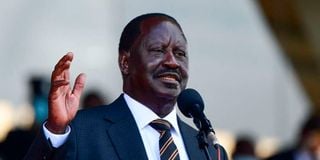When Raila exits political scene, who is likely to inherit Odinga caliphate?

Orange Democratic Movement leader Raila Odinga.
As Kenyans voted in the presidential election on August 9, the Odinga caliphate of Luo Nyanza were unanimously chorusing Britain’s most famous sports anthem: “It is coming home!” But when then Deputy President William Ruto emerged victorious against long-time opposition leader Raila Odinga, the Luo nation was despairingly calm.
Raila, 77, who entered the race as favourite—and with state backing to boot—had had his fifth near-miss, which could well be his last. In his 30-plus years in politics, he’s an astute mobiliser and crowd puller. He is nicknamed “Baba” (Father), “Agwambo” (Act of God) and “Tinga” (Tractor), drawn from his party symbol in the 1997 elections.
I’ve previously echoed other scholars’ sentiments about the ethnic nature of Kenyan politics. Now I will look at its intricacies and what it means for the Luo nation bloc.
Every commentary and documentary evidence of Kenya’s democratic process has one name inscribed all over it: The Odinga family. Raila, as former Vice-President Michael Wamalwa once opined, leaves no room for fence-sitting: Love or hate him. He’s been described as the enigma of Kenya’s politics.
To supporters, he’s a democrat who sacrificed a lot in his fight against the Kanu dictatorship and caused the transformation of many a constitutional body, culminating in his successful fight for the 2010 Constitution.
Others see him as one who will do anything to gain power, even at the expense of his supporters. They cite his alleged role in the 1982 coup, joining forces with Narc in 2002 to defeat then President Daniel arap Moi’s protege, gunning for the Grand Coalition Government as Prime Minister with President Mwai Kibaki following the 2007/2008 post-election violence over the presidential poll results, and the 2018 “Handshake” with President Uhuru Kenyatta. All that, many commentators opine, he did for selfish aggrandisement.
Mould a successor
Raila has also been accused of meddling in the grassroots elections of his Orange Democratic Movement (ODM) party, to the extent of deciding who holds what position and who gets elected or nominated. While many people view him as a democrat, some in ODM see him a ruthless dictator who has stifled political contestation in his backyard.
ODM nominations have always brought up claims of rigging or unfairness. That has led to a falling-out with some of his former political hacks and blamed for voter apathy in his strongholds and losing the presidential vote.
His failure to identify and mould a successor has everything revolving around him.
However, in a country where political parties hardly survive two electoral cycles, Raila deserves credit for seeing ODM hold up for over 17 years and mobilise well beyond his community. With his imminent exit from active politics, will the internal party organs ensure the longevity of the orange party?
Raila enjoys a massive passionate following from the Luo nation, which votes him to the last man. Former Kakamega Senator Cleophas Malala described Raila’s following as “organic” and him the only Kenyan who doesn’t need to pay a crowd to attend his rally.
Who will take up the Raila legacy as the community’s kingpin and will they inherit the support base fully? Will the person have Raila’s blessing? While the latter is possible, what about the new “Hustlers versus Dynasties” wave?
The bloc must look beyond tribe for a successor who can galvanise their support for their own good and the country’s.
Raila’s heir must not be his tribesman. For a start, the community owe his former running mate Kalonzo Musyoka politically, and what would be a better way to repay the debt? But he must remain loyal to Baba.
There are three local options. First, the hereditary nature of politics would mean one of Raila’s children or close family pick up the baton—as Raila did, from his father. I do not see one for now.
Secondly, a Raila ally. But, going by the recent polls, I see no one. Those able—like Anyang’ Nyong’o and James Orengo—are almost his age and will most likely exit with him.
The younger generation—the likes of John Mbadi, Gladys Wanga, Junet Mohamed and Babu Owino—need at least two electoral cycle to have a grip on the region. Thirdly, it may be that outsider, who may have worked with Raila but they fell out. Dr Evans Kidero, Miguna Miguna, Mark Matunga, Eliud Owalo, Okoth Obado and Raphael Tuju come to mind. This is a more progressive approach. But they must work together with the other groups with Raila behind the scenes.
The next head of the Odinga caliphate must have the capacity to mobilise across ethnic lines and have reform credentials like Raila’s.
Mr Amin is a university lecturer and governance expert. [email protected].





